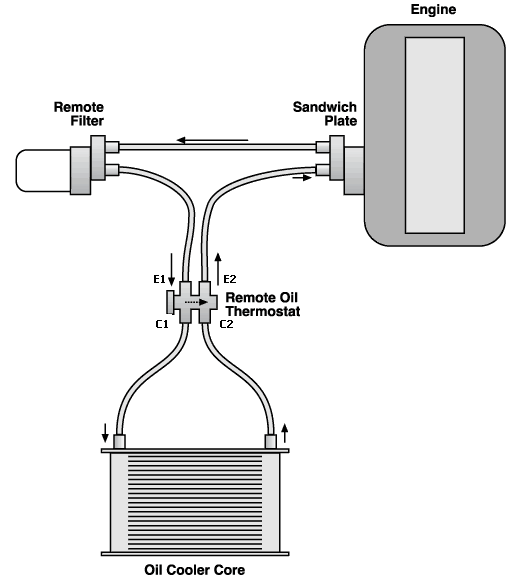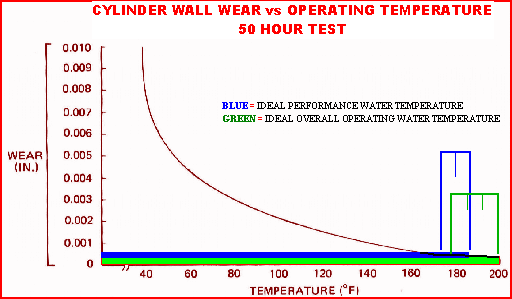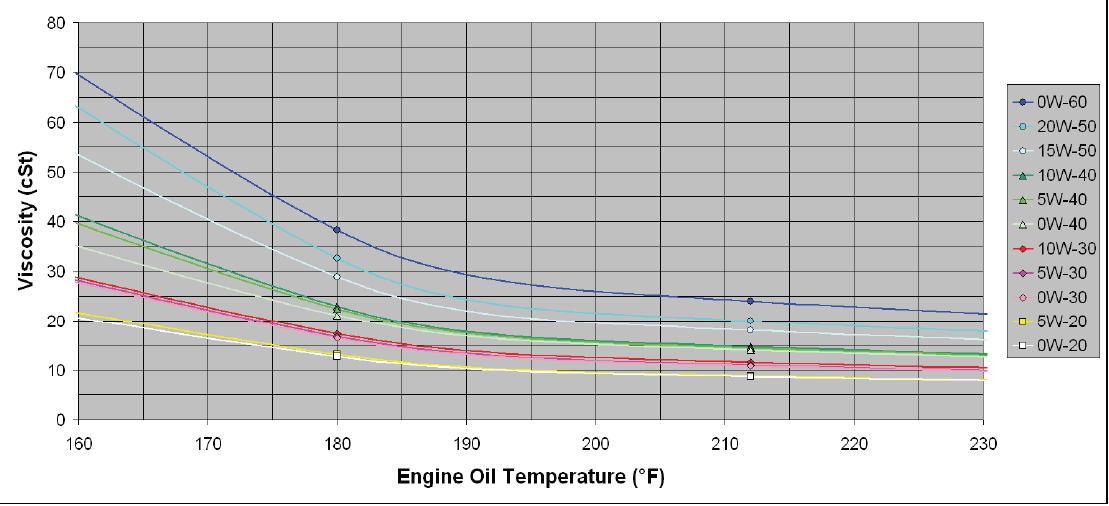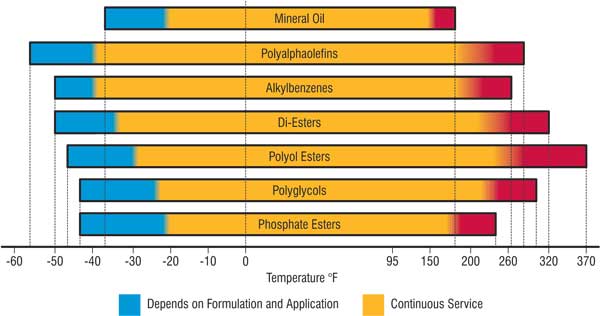I recently had a few friends take the time to take notes on a bit of research on engine stabilization temp vs time, as I'm fairly sure that my corvette is hardly average as Ive done a great deal of modifications, to that engine, in fact theres not a single component that was originally in the engine except the engine block and even thats been bored .030 over and had splayed main caps installed.
An operating temperature is the temperature at which an engine or mechanical device like a transmission,is designed too operate . The device will normally operate effectively within a specified temperature range, when properly maintained and lubricated, the temperature range varies based on the device function and application context, and ranges from the minimum operating temperature to the maximum operating temperature (or peak operating temperature). Outside this range of safe operating temperatures the device may fail
keep in mind your engine clearances WILL NOT be near ideal nor will the lubricants function at full efficiency until the engine temps stabilize, and yes if I drive the car under conditions where I treat it like I just bought it and I was an 18 year old , the temps rise faster but thats not ideal, for engine durability so I don,t drive the car inducing significant stress until it reaches operational temp stability.
coolant temps tend to run 10F-15F lower than oil temps in American v8 engines and oil temps should ideally range from about 190f-220f for max durability with the lower end of the oil temp range preferred
you will induce increased stress on any engine if you jump into the car and drive it like you stole it before the cars drive train temps stabilize, this tends to increase wear and parts failures
Ive always wondered what the average time frame was that the cars engine took for the average muscle cars engines coolant and oil temps trans fluid etc. to get up to operating temperature then stabilize, I defined that for the purpose of this bit of research as watching both temp gauges and noting at what temperature the engine seems to peak, then start to cool of and then re-reach that COOLANT temp.
\(oil temps in my car stabilize at 206F then bounce to 210F under similar conditions)
so for example on my corvette that admittedly is far from stock, the 383 SBC with its 10 quart oil pan, windage tray, and trans cooler installed,
yes you can ignore the linked info, but you might be amazed at what , reading through them will do to help understand the answers to several questions that deal with related factors. coolant temps generally run 10F-15F lower than oil temps and oil temps kept in the 190F-215-220F range generally produce the best performance compromise.
http://forum.grumpysperformance.com/viewtopic.php?f=57&t=9880&p=37712&hilit=t+stat#p37712
http://forum.grumpysperformance.com/viewtopic.php?f=54&t=1334
http://forum.grumpysperformance.com/viewtopic.php?f=54&t=6327
http://forum.grumpysperformance.com...10698&p=46493&hilit=piston+temperature#p46493
http://forum.grumpysperformance.com...=9816&p=40642&hilit=piston+temperature#p40642

the engine in my corvette, reaches 190f-192 F then tends to drop to about 185f-187F then constantly cycle from 190F-to 185-187F then back to 190F IF I drive it too the local store for example and it will rarely if ever see 3000rpm while I'm just cruising and allowing the oil and coolant temps to come up to operational temps.
The process in my corvette, almost always requires I drive 3-4 miles minimum, on the local streets at lower rpms, and can take at least 6-7 minutes for both the coolant and oil temps too stabilize and the corvettes the oil temps , and trans fluid temps that usually take longer by easily 2 minutes,(most likely due to the oil cooler in the system)
so I asked my local friends to take notes on a wide variety of various cars , the average time and distance required for the local guys cars engine temps seems to fall at or very close to the 4-5 miles and 6-7 minutes time frame regardless of the car or engine size, its compression, rear gear ,transmission, tire diam. car weight or any other factors I could ask about
now Id point out that Im located in Florida and average air temps tend to fall in the 60F-80F range during the time frame Ive had them take notes so if your some place like Colorado , New York, Oregon,or Canada, where you see SNOW this time of tear, Id expect the average air temps to be lower and the resulting time span to take longer as a result.
IF YOUR ONE OF THOSE FEW GUYS WHO STILL RELY ONLY ON IDIOT LIGHTS VS ACCURATE GAUGES< AND ITS BEEN MONTHS SINCE YOU CHECKED YOUR OIL LEVEL,YOULL, FIND A GOOD DEAL OF INTERESTING INFO ON THE SITE IF YOU CARE TO LOOK AROUND




IF you care to provide a bit more related info,WHAT IS YOUR cars time frame to stabilize?
RELATED INFO
viewtopic.php?f=50&t=930&p=30043&hilit=gauges+fuel+pressure+temp#p30043
viewtopic.php?f=57&t=4701
viewtopic.php?f=57&t=176
viewtopic.php?f=54&t=6327
viewtopic.php?f=32&t=3954
viewtopic.php?f=54&t=2187
viewtopic.php?f=54&t=1334
viewtopic.php?f=54&t=10500
viewtopic.php?f=57&t=4974
viewtopic.php?f=54&t=2080
viewtopic.php?f=54&t=10186
An operating temperature is the temperature at which an engine or mechanical device like a transmission,is designed too operate . The device will normally operate effectively within a specified temperature range, when properly maintained and lubricated, the temperature range varies based on the device function and application context, and ranges from the minimum operating temperature to the maximum operating temperature (or peak operating temperature). Outside this range of safe operating temperatures the device may fail
keep in mind your engine clearances WILL NOT be near ideal nor will the lubricants function at full efficiency until the engine temps stabilize, and yes if I drive the car under conditions where I treat it like I just bought it and I was an 18 year old , the temps rise faster but thats not ideal, for engine durability so I don,t drive the car inducing significant stress until it reaches operational temp stability.
coolant temps tend to run 10F-15F lower than oil temps in American v8 engines and oil temps should ideally range from about 190f-220f for max durability with the lower end of the oil temp range preferred
you will induce increased stress on any engine if you jump into the car and drive it like you stole it before the cars drive train temps stabilize, this tends to increase wear and parts failures
Ive always wondered what the average time frame was that the cars engine took for the average muscle cars engines coolant and oil temps trans fluid etc. to get up to operating temperature then stabilize, I defined that for the purpose of this bit of research as watching both temp gauges and noting at what temperature the engine seems to peak, then start to cool of and then re-reach that COOLANT temp.
\(oil temps in my car stabilize at 206F then bounce to 210F under similar conditions)
so for example on my corvette that admittedly is far from stock, the 383 SBC with its 10 quart oil pan, windage tray, and trans cooler installed,
yes you can ignore the linked info, but you might be amazed at what , reading through them will do to help understand the answers to several questions that deal with related factors. coolant temps generally run 10F-15F lower than oil temps and oil temps kept in the 190F-215-220F range generally produce the best performance compromise.
http://forum.grumpysperformance.com/viewtopic.php?f=57&t=9880&p=37712&hilit=t+stat#p37712
http://forum.grumpysperformance.com/viewtopic.php?f=54&t=1334
http://forum.grumpysperformance.com/viewtopic.php?f=54&t=6327
http://forum.grumpysperformance.com...10698&p=46493&hilit=piston+temperature#p46493
http://forum.grumpysperformance.com...=9816&p=40642&hilit=piston+temperature#p40642

the engine in my corvette, reaches 190f-192 F then tends to drop to about 185f-187F then constantly cycle from 190F-to 185-187F then back to 190F IF I drive it too the local store for example and it will rarely if ever see 3000rpm while I'm just cruising and allowing the oil and coolant temps to come up to operational temps.
The process in my corvette, almost always requires I drive 3-4 miles minimum, on the local streets at lower rpms, and can take at least 6-7 minutes for both the coolant and oil temps too stabilize and the corvettes the oil temps , and trans fluid temps that usually take longer by easily 2 minutes,(most likely due to the oil cooler in the system)
so I asked my local friends to take notes on a wide variety of various cars , the average time and distance required for the local guys cars engine temps seems to fall at or very close to the 4-5 miles and 6-7 minutes time frame regardless of the car or engine size, its compression, rear gear ,transmission, tire diam. car weight or any other factors I could ask about
now Id point out that Im located in Florida and average air temps tend to fall in the 60F-80F range during the time frame Ive had them take notes so if your some place like Colorado , New York, Oregon,or Canada, where you see SNOW this time of tear, Id expect the average air temps to be lower and the resulting time span to take longer as a result.
IF YOUR ONE OF THOSE FEW GUYS WHO STILL RELY ONLY ON IDIOT LIGHTS VS ACCURATE GAUGES< AND ITS BEEN MONTHS SINCE YOU CHECKED YOUR OIL LEVEL,YOULL, FIND A GOOD DEAL OF INTERESTING INFO ON THE SITE IF YOU CARE TO LOOK AROUND




IF you care to provide a bit more related info,WHAT IS YOUR cars time frame to stabilize?
RELATED INFO
viewtopic.php?f=50&t=930&p=30043&hilit=gauges+fuel+pressure+temp#p30043
viewtopic.php?f=57&t=4701
viewtopic.php?f=57&t=176
viewtopic.php?f=54&t=6327
viewtopic.php?f=32&t=3954
viewtopic.php?f=54&t=2187
viewtopic.php?f=54&t=1334
viewtopic.php?f=54&t=10500
viewtopic.php?f=57&t=4974
viewtopic.php?f=54&t=2080
viewtopic.php?f=54&t=10186
